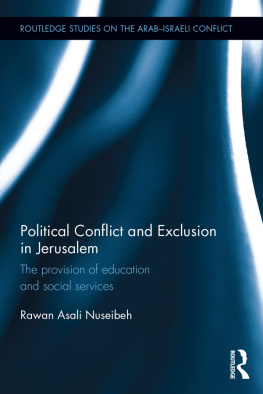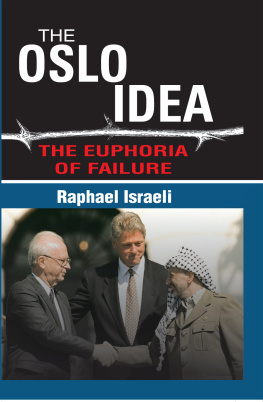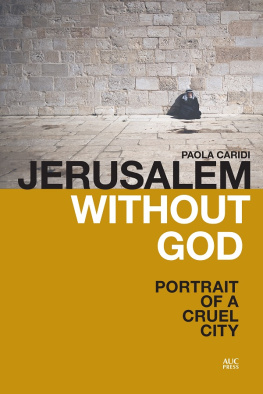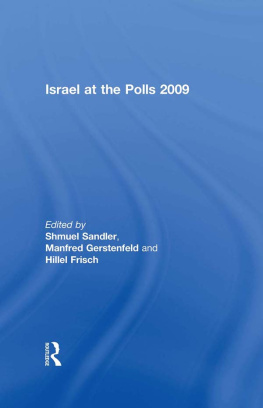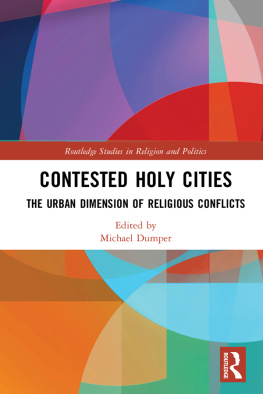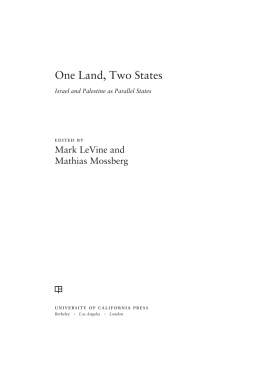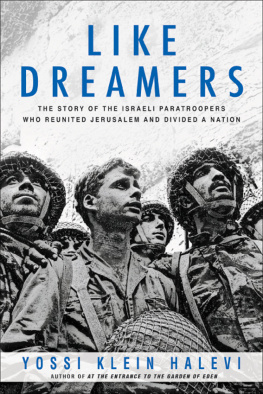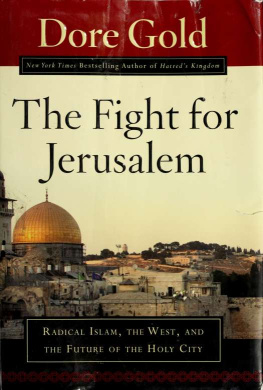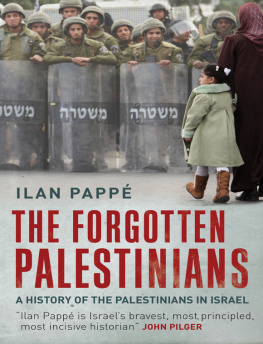JERUSALEMUNBOUND
JERUSALEMUNBOUND
GEOGRAPHY, HISTORY, AND THE FUTURE OF THE HOLY CITY
MICHAEL DUMPER
Columbia University Press
New York

Columbia University Press
Publishers Since 1893
New York Chichester, West Sussex
cup.columbia.edu
Copyright 2014 Columbia University Press
All rights reserved
E-ISBN 978-0-231-53735-3
Library of Congress Cataloging-in-Publication Data
Dumper, Michael, author.
Geography, history, and the future of the holy city / Michael Dumper.
p. cm.
Includes bibliographical references and index.
ISBN 978-0-231-16196-1 (cloth: alk. paper)ISBN 978-0-231-53735-3 (e-book)
1. JerusalemHistory. 2. JerusalemInternational status. 3. JerusalemBoundaries. 4. JerusalemEthnic relations. 5. Israeli West Bank Barrier. 6. Arab-Israeli conflict1993Peace. 7. Arab-Israeli conflict1993Territorial questions. 8. Diplomatic negotiations in international disputes. I. Title.
DS109.15.D86 2014
956.94'42dc23
2013039550
A Columbia University Press E-book.
CUP would be pleased to hear about your reading experience with this e-book at .
Cover Design: Jordan Wannemacher
Cover Image: AP Images
References to Web sites (URLs) were accurate at the time of writing. Neither the author nor Columbia University Press is responsible for URLs that may have expired or changed since the manuscript was prepared.
To my brother and sister, Nicholas and Hildegard
CONTENTS

MAP 0.1. Jerusalem and Region
THERE ARE SCORES of people who have helped in writing this book. Some did so directly by agreeing to be interviewed or by providing feedback, advice, and introductions to others. Others did so indirectly through informal conversations, though mealtimes at their homes with their friends and families, and by letting me share a part of their lives. I offer them all my deepest and most humble thanks for their time and effort, which they gave freely and graciously. This whole endeavor would have been much poorer without their support and interest. In particular, I would like to thank my colleagues who worked closely with me on the Conflict in Cities and the Contested State projectWendy Pullan, Liam ODowd, James Anderson, Max Sternberg, Britt Baillie, Rami Nasrallah, and Haim Yaacobi. Of this excellent team I would like especially to mention three people: Craig Larkin, my research associate for the five-year duration of the projectour collaborative study of the city was a highlight of the project for me; Lefkos Kyriacou, the cartographer of the project, who put many hours into developing the maps used in this book and also supplied some of the photographs; and Razan Makhlouf, my fieldwork research assistant and photographer whose photographs are also included in this book. Much appreciation must also go to Adam Whittock for helping in the preparation of the manuscript for publication.
In Jerusalem and the region there are almost too many people to mention but in particular I would like to thank Amneh Badran, Azem Bishara, Hillel Cohen, Ray Dolphin, Fouad Hallak, Mahmoud Hawari, Kevork Hintlian, Hiba Husseini, Adnan Husseini, Huda Iman, Nazmi al-Jubeh, Haifa Khalidi, Israel Kimhi, Menachem Klein, Ruth Lapidoth, Awad Mansour, Meir Margalit, Yusuf Natshe, Mazen Qupti, Amnon Ramon, Yitzhak Rieter, Bernard Sabella, Maha Samaan, Patricia Sellick, Danny Seideman, and Salim Tamari. Their encouragement often went beyond the call of duty, and I am grateful for their time and insights, in some cases, their friendship and hospitality. Others not resident in Jerusalem were also of great help. These include Trond Bakkevig, Marshall Breger, John Bell, Michael Bell, Rosemary Hollis, and Mike Molloy. All the aforementioned people may have contributed to my understanding of the dynamics of the city, but they are in no way responsible for any mistakes or inaccuracies. Finally I would like to thank by wife, best friend, and partner, Ann, and my two boys, Rowan and Declan, for their forbearance during the course of writing this book. When I was physically at home, I was often either locked in my study or mentally and emotionally in Jerusalem.
I would also like to thank the Economic and Social Research Council for providing the funds to conduct the research on this book. The full title of the project is Conflict in Cities and the Contested State: Everyday Life and the Possibilities for Transformation in Belfast, Jerusalem and Other Divided Cities (Research Grant No: RES-060250015).
...
A note on the transliteration of Arabic and Hebrew words and names into English is required. One of the main problems in arriving at a consistent transliteration system has been the crossover of Arabic and Hebrew names. Many English transliterations of Arabic names are actually transliterations of Hebrew transliterations of Arabic. A good example is the way in many English texts al-Azariyya (transliteration from the Arabic) is spelt Eizariya (English transliteration of the Hebrew transliteration of the Arabic).always easy, and some inconsistencies have crept in for which I apologize. In the main this book uses the transliteration system followed by the International Journal of Middle East Studies except where English names a better known; for example, I use Bethlehem, not Bayt Lahm (Arabic), Temple Mount, not Har Habayit (Hebrew). However, I do use Haram al-Sharif rather than its English translation, the Noble Enclosure, which is not so well used and I find to be an ugly translation.
| ACRI | Association for Civil Rights in Israel |
| CEC | Central Elections Commission |
| EU | European Union |
| IDRC | International Development Research Centre |
| OPTs | Occupied Palestinian Territories |
| PLC | Palestinian Legislative Council |
| PLO | Palestinian Liberation Organization |
| PA | Palestinian Authority |
| PNA | Palestinian National Authority |
| NGO | Nongovernmental Organization |
| UN | United Nations |
| UNCC | UN Conciliation Commission on Palestine |
| UNCTAD | UN Conference on Trade and Development |
| UNDOF | UN Disengagement Observer Force |
| UNDP | UN Development Program |
| UNEF | UN Emergency Force |
| UNESCO | UN Educational, Scientific and Cultural Organization |
| UNGA | UN General Assembly |
| UN GAOR | UN General Assembly Official Records |
| UNHCR | UN High Commissioner for Refugees |
| UNICEF | UN Childrens Fund |
| UNIFIL | UN Interim Force in Lebanon |
| UNISPAL | UN Information System on the Question of Palestine |
| UNOCHA | UN Office for the Coordination of Humanitarian Assistance |
| UNOGIL | UN Observation Group in Lebanon |
| UNRWA | UN Relief and Works Agency for Palestine Refugees in the Near East |
| UNSC | UN Security Council |
| UNSCOP | UN Special Committee on Palestine |
| UNSCMEPP | UN Special Coordinator for the Middle East Peace Process |
| UNTSO | UN Truce Supervision Organization |
Only when borders disappear does the need arise to construct walls
Next page

